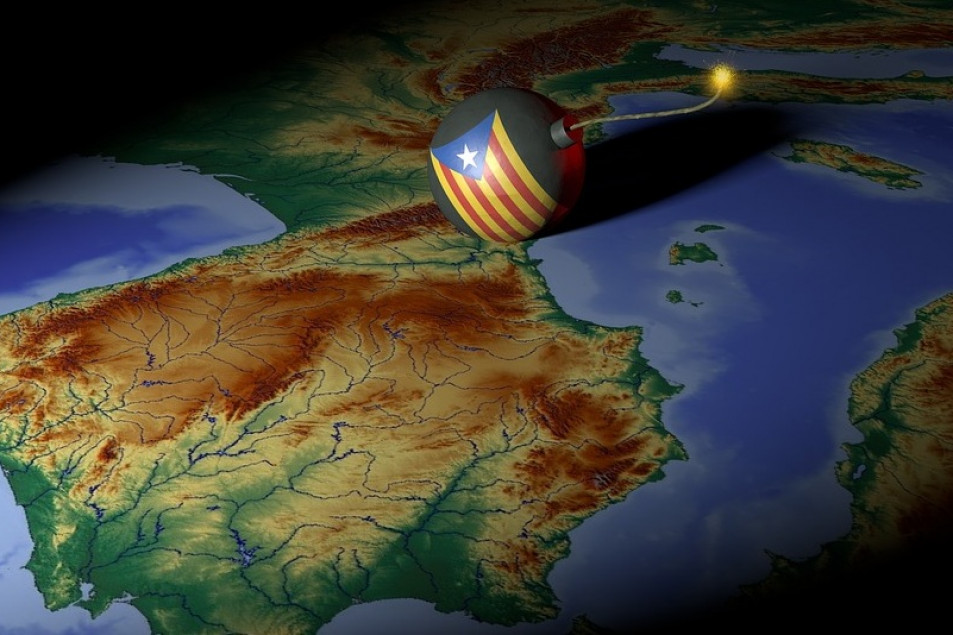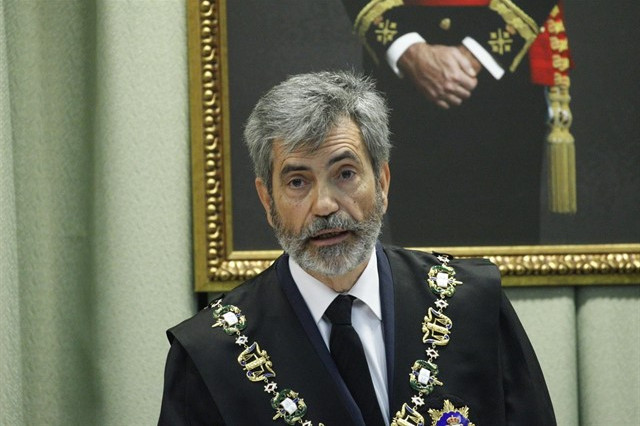On March 21st, 2018, the Spanish justice issued a European arrest warrant against the president of the Catalonian regional government, Carles Puigdemont. The Spanish authorities have demanded that he be prosecuted and handed over to them for acts of "rebellion" and "corruption" in the form of embezzlement of public funds. The accusations are based on the activities of Mr. Puigdemont in the prolonged conflict between Catalonia and the Spanish central government over the independence of Catalonia. Among others, the accused requested a referendum on the independence of Catalonia, while previously it had been deemed illegal by the Spanish Constitutional Court. The implementation of the referendum, the material, the necessary documents for the vote and the other measures put into practice in this framework resulted in an expenditure of 1.6 million Euros, but also in violent confrontations with the police.
Puigdemont was arrested in Germany on March 25th, 2018, after crossing the border between Denmark and Germany. At the request of the General Prosecutor of the State of Schleswig-Holstein, the First Chamber of the Higher Regional Court of Schleswig-Holstein decided, on 5th April 2018, to order the accused to be detained and extradited. However, it was later decided to suspend his detention pending guarantees of his delivery under certain conditions (Schleswig-Holsteinische Oberlandesgericht, 1 Ausl (A) 18/18 (20/18), Decision of 5th April 2018).
The Superior Regional Court considered that the request for delivery based on the criminal offense of "rebellion" is inadmissible.
According to the German court, the requirement of double criminality was not fulfilled in this case, since it lacked the description of the facts as "high treason": an "equivalent" criminal offense in the German Criminal Code (§ 81 Strafgesetzbuch - StGB). The necessary constituent element was "violence". Regarding the accusation of "corruption" (misappropriation of funds), the Chamber requested additional information to examine more closely the admissibility of the European arrest warrant for this crime. On May 22th, 2018, they again rejected the requests of the State Prosecutor of Schleswig-Holstein to rewrite the European arrest warrant and order the arrest of Carles Puigdemont. The new evidence presented could not shake the opinion of the court. He did not consider the additional offense of breach of the peace ("Landfriedensbruch", § 125 of the German Penal Code) relevant in the absence of individual responsibility for an offense.
The Higher Regional Court of Schleswig was not the only one to refuse the delivery of Carles Puigdemont on the basis of the European arrest warrant.
The Belgian judicial authorities also failed to comply with Spain's request, partly for formal reasons, and refused to hand over the former ministers of the Generalitat of Catalonia. In Germany, the provisional freedom of Puigdemont had a positive reception. The defendant by the Spanish judicial authorities appears in the German and European media as a freedom fighter. On the contrary, the Spanish Supreme Court, after an initial cautious reaction, criticized the decision of the Higher Regional Court of Schleswig that it considers inadequate for the problems created by the secession attempts in Catalonia. The result is a situation of legal and political anxiety. This concern is barely perceptible in the judicial system and in German public opinion. However, it is much more so in other Member States: this European arrest warrant, founded as the legal instrument in the European Union and supposedly the cornerstone of the European area of freedom, security and justice, is part of a individual political context, that of a power struggle, in which European criminal law appears to be fragile.
The European arrest warrant applies to theft of motor vehicles, however, when it comes to macro-political crimes, it does not work.
The reactions of the German judicial authorities and other European judicial authorities to the request for a Spanish arrest warrant, the demand for a democratic rule of law, present us that European criminal law is a reflection of the crisis of confidence between Member States in the European Union: a crisis resulting from the loss of common legal principles.
As in a case that would become evident, the Higher Regional Court examined the German legal situation according to the law on international mutual legal assistance (§ 79 IRG) as applied to the Puigdemont case. The political aspect of the matter is eliminated by the routine of the national law. However, in the end we are faced with a European legal problem, which goes beyond this national routine and can only be resolved in a legally appropriate manner if the arguments presented, in individual the case law of the Court of Justice in the European Union on the Framework Decision 2002/584, the principle of mutual recognition in European legislation and the requirement of double criminality, are properly analyzed. Such an analysis may reveal the loss of the principles of European criminal law. At the same time, it provides the possibility of specifying the principles of an area of European criminal law and its critical power function. For European legal problems, there are European courts. The Higher Regional Court of Schleswig should have referred the case to the Court of Justice through the preliminary ruling procedure.
NATIONAL CRIMINAL LAW ROUTINE
A European arrest warrant is a European legal instrument applied between the judicial authorities of the EU Member States. The issuing State may require that it be implemented in any other Member State. The precondition is that the states involved trust each other. It is assumed that the same legal rules apply. The European arrest warrant includes a list of crimes for which there is much trust: it is no longer a matter of whether the conduct listed falls within the law of the requested State and is also punishable. For other offenses that are not listed, the State's criminal routine seems to apply.
According to German law § 15 para.1 of the International Mutual Assistance in Criminal Matters Act ("Gesetzüber International Rechtshilfe in Strafsachen" - IRG): a defendant has to be detained for the purpose of extradition upon the filing of an international arrest warrant or European, unless this is inadmissible from the beginning (§ 15 for 2 IRG). If a European arrest warrant is filed, the special provisions of Sec. 79 and following IRG. These provisions relate in individual to the double criminality requirement, a requirement that does not apply if the European arrest warrant is related to one of the acts in the list of EU Framework Decision 2002/584. This is not the case with respect to the charge of "rebellion", which does not figure in the list of crimes.
Consequently, the implementation of the arrest warrant and the admissibility of the detention by delivery presuppose a double criminalization under Spanish and German criminal law.
According to the law on international mutual legal assistance (§ 3 paragraph 1 IRG), this depends on the qualification of the facts. The object of the examination -hypothetical- is an illegal act in the sense of criminal proceedings (see Kubiciel, in: Both/König/Rackow (Hrsg.), Rechtshilferecht in Strafsachen, § 3 IRG, N. 25, Schomburg/Lagodny, IRG, § 3, N. 5). The purpose of the investigation is to determine whether the facts mentioned in the delivery request would be punishable under German criminal law. For this purpose, the facts declared by the requesting State should be taken into consideration as having occurred on German territory (Kubiciel, AAO, Rz.26, Schomburg/Lagodny, Cit, N. 11).
In this context, the Higher Regional Court of Schleswig-Holstein examines, rightly, whether the facts that the Spanish courts classify as a crime of rebellion would be punishable by a criminal sanction in German territory in accordance with German criminal law (§ 81 StGB). To do this, they rely on a case with similar events ruled on by the Federal Court of Justice, in which there were violent confrontations during demonstrations against the construction of the west runway at Frankfurt airport. The prosecution was for "coercion" against constitutional bodies. For the Spanish Supreme Court, among others, it is irritating to observe that a very significant act of state policy, declared unconstitutional in Spain, is minimized in a German court and is somehow considered trivial, from the point of view of state protection under criminal law.
The facts of this case, taken as a point of comparison, can also influence the double criminality examination because they establish different premises for the interpretation of the respective facts. The purpose of the judgment of the German Federal Court ("Bundesgerichtshof" - BGH) (BGHSt 32, 170 ff. (Judgment of November 23, 1983), Fischer, Strafgesetzbuch, § 81, N. 6a.) was the interpretation notion of violence and its definition in relation to attacks on freedom and the incrimination of "coercion", whose definition is more restrictive (Fischer, op.cit.). As a result, the constituent element of the "violence" for the constitution of the high treason offense is not fulfilled by the mere physical restriction linked to the coercive means; rather, it is necessary that the pressure exerted on the constitutional body, taking into account the circumstances that characterize the coercion, appears to be appropriate to divert the will of the constitutional body (Fischer, Strafgesetzbuch, § 105, N. 3). The obstacle to the acceptance of coercion is all the more significant in the context of high treason, since it has to be assumed that constitutional institutions are particularly prudent and rational enough to withstand political pressure (Fischer, op.cit.).
These high demands of "compulsive visions", which have been presented in the context of high treason, do not seem to be necessary in Spanish criminal law (The German criminal law dogma distinguishes between "absolute vis" and "vis-à-vis obligations" with respect to the constitutive element of "violence". While "absolute vis" completely eliminates the will of the other,"compulsive vis" means that the will of others is inclined).
According to the facts stated in the request for handing over, it is sufficient to assume the facts of rebellion so that the accused person accepts at least the violence perpetrated against the police officers or even considers it probable.
Therefore the Superior Regional Court declared that the "acts of violence that took place on the day of the vote" are in any case, attributable to the person being processed (OLG Schleswig-Holstein) as "high treason" the facts do not lack the characteristics of violence, but rather of its intensity, which is a necessary condition for the constitution of the offense, considering that the German criminal law on high treason retains a stricter and more restrictive concept of "violence" than the Spanish criminal law as regards to the crime of rebellion, which the regional superior court does not uphold, not the double criminality.
DISRUPTION OF EUROPEAN LAW
However, it is possible that the inadmissibility of detention for delivery, based on reasoning in German criminal law, does not fall under European law or, given the European procedural context, it has to at least be completed by them. It is particularly interesting to consider whether, given the individual nature of the provisions on "extradition" in the framework of a European arrest warrant, the provisions relating to double criminality, under international law derived from § 3 El WRI, has to be adapted to the light of the European provisions and their interpretation by the Court of Justice in the European Union.
The Mutual Legal Assistance Act of Germany gives priority to the rules of extradition and compliance between the EU Member States on traditional bilateral rules between sovereign States.
This priority is the basis of the principle of the legitimacy of mutual recognition of judicial decisions, which is considered the heart of the area of freedom, security and justice in the European Union and judicial cooperation among its Member States. The principle is supported by the mutual trust of the EU Member States in the functioning of the democratic rule of law, and particularly the protection of fundamental rights and the independence and impartiality of the judiciary. In the context of requests for mutual legal assistance between the Member States in the European Union, the principle of double criminality is considered an exception to the principle of mutual recognition, an exception that has to be interpreted "strictly" (see recently CJEU, Judgment 11.1)..2017 (Case C-289/15) (Grundza Case), Sec. 41 and 46, Judgment of the CJEU of 5.4.2016 (C-404/15 and C-659/15 PPU) (Aranyosi and Caldararu), §§ 77 S. CJEU, Judgment of 29.06.2017 (C-579/15) (Poplawski), §§ 29 ys).
In this context, the Court of Justice in the European Union has interpreted the principle of double criminality. It is questionable whether the criteria expounded by the Court support the interpretation of the Higher Regional Court of Schleswig-Holstein or whether they may involve additional legal considerations or even oppose the interpretation of the German court. It is above all the condition of the equivalent qualification of the factual elements and the complete examination of the constituent element of violence according to § 81 StGB. of Article 2 (4) of the Framework Decision 2002/584 of the EU authorizes, for acts outside the aforementioned list, the possibility of examining double criminality. This examination has to be carried out independently of the facts of the case and the description of the offense.
According to the jurisprudence of the Court of Justice in the European Union, it is necessary and sufficient that the acts on which the crime is based in the issuing State also constitute an offense in the executing State. The identity of the offenses in the two affected Member States is not necessary (see CJEU, judgment of 11.1.2017 (case C-289/15) (Grundza case), § 34). Therefore, it is not necessary to establish an exact correspondence between the constituent elements of the infringement, as defined in the legislation of the issuing and enforcing Member States, or the denomination or classification of these offenses according to the respective systems national legal systems (§ 35). Therefore, it is insignificant that the facts of the case, as communicated by the Spanish judicial authorities, correspond to the crime of rebellion in Spain and to that of treason in Germany. The essential criterion is rather the correspondence between the factual elements on which the offense is based, as reflected in the judgment issued in the issuing State, and the classification of the offense according to the legislation of the executing State. (§ 36). Thus, at first glance, the approach of the Higher Regional Court of Schleswig-Holstein, which, like the prevailing opinion in the German law of mutual legal assistance, presupposes a procedural act has to be fully evaluated by a hypothetical examination in accordance with the premises.
From the German criminal law point of view, it also seems to be supported by the most recent jurisprudence of the Court of Justice in the European Union.
However, this is only superficial: for example, the Court of Justice in the European Union requires that the competent authority of the executing State adopt a "flexible approach" when assessing the condition of double criminality "to satisfy as far as possible the request for delivery (§ 36). "This jurisprudence indicates that the equivalence of the factual characteristics and the criminal offense in the executing State does not mean a complete normative interpretation of the factual elements and their potentially contradictory dogmatic interpretation, but rather a general correspondence. Therefore, in view of the injustice constituted by the facts, the Court of Justice in the European Union simply demands that the facts of the case be subject to a criminal sanction "as such" in the executing State (§ 38). The European Court of Justice departs from the dogma of crime in criminal proceedings and takes into account the character of the double incrimination as an exception to mutual recognition. According to the Court's report, only a "relatively high level of abstraction" of the relevant offenses is recorded (see also the conclusions of Advocate General Michal Bobek of July 28th, 2016, case C-289/15). § 76). It follows that "the perfect correspondence of the taxonomy used" is irrelevant (Op. Cit., § 77). Therefore, implementing a criminal law, that is to say, the dogmatic interpretation in the requesting Member State, may have to be recognized in the executing State, even if its application and interpretation would have led to a different result in the State of enforcement implementation (now explicitly in the CJEU, Judgment of 23.1.2018 (C-367/16) (Piotrowski), § 52. However, we should note that this sentence is within the context of the conditions of prosecution of minors).
Given this penetration of double criminality in European law and the similar characterization of the facts of the case, the requirements of the Regional High Court and the German law of mutual legal assistance as a whole might be excessive. Instead of a full examination of the facts under German criminal law, it would be sufficient that the crimes of rebellion and high treason are similar in content. The conclusion of the High Court of Germany that the defendant has to take into account the violence during the referendum could be a sufficient condition to meet the requirements of European legislation on double jeopardy. However, it would be irrelevant to admit detention for surrender, and any subsequent concession of the latter, that German criminal law has a more restrictive dogmatic approach to the constituent element of violence. Therefore, the executing State has to recognize the broad interpretation of the element of violence by the requesting State.
Regarding the accusation of misappropriation of public funds by the Spanish courts, the examination of double criminality was abandoned, since it can be linked to "corruption" in the list of crimes contemplated in article 2 of the framework decision on the European arrest warrant, the opinion of the requested State is indeed relevant. To assess whether the circumstances of the crime are adequately described (Article 83a (1) N. 5 IRG), the only requirement is that the requesting State has to plausibly indicate the requirements of the crime under Spanish law. Therefore, it is irrelevant whether a financial loss, in the sense of German criminal law, occurred if, according to Spanish law, the fact of incurring financial obligations for the referendum would be punishable.
EUROPEAN COURTS JUDICIAL REVIEW
The Higher Regional Court of Schleswig-Holstein does not consider that the criterion of double criminality was met in light of the accusation of "rebellion" made by the Spanish courts and considered that detention for extradition was inadmissible from the beginning. This is in accordance with the criteria for the examinations generally recognized by the German Law on Mutual Legal Assistance, according to which a conversion of the facts and a complete examination of the facts communicated by the requesting State has to be carried out, as if the act had took place in German territory. Therefore, the offense of high treason presupposes a much more restrictive concept of violence than the offense of Spanish rebellion.
The criterion of double criminality, at least in the context of a delivery request based on a European arrest warrant, has to be interpreted in accordance with European legislation.
On one hand, according to this criterion, the analogous conversion of the facts, based on the procedural conception of the facts and the subsequent hypothetical examination by the Court of Justice in the European Union, is maintained in principle. However, on the other hand, it seems that European law simply requires that the elements of the offense be identical in content and not in its concrete application.
In light of European legislation, the Higher Regional Court of Schleswig-Holstein and the Supreme Court of Spain should have asked the Court of Justice in the European Union to issue a preliminary ruling under Article 267 of the TFEU to clarify whether the principle of dual criminality in the context of the characterization of the facts in the criminal State by the criminal law also includes a concrete examination of the interpretation of a criminal law by the executing State if this is more restrictive than the interpretation of the requesting State. Of course, this is an unusual technique that fractures the German legal routine. The result can also be politically sensitive, even more so when it becomes clear that Europe's criminal justice system does not follow common standards in any way. However, if the political anxiety surrounding the Carles Puigdemont affair should lead to the conclusion that the area of freedom, security and justice lacks politically resistant legal principles, this would offer a good perspective for the development and implementation of the law of European criminal law.












